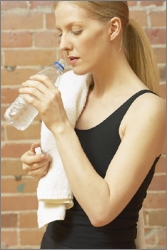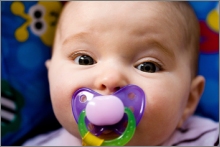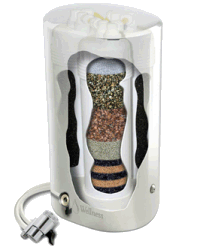Warning: Diabetes, Liver, and Heart Disease Linked to Everyday Plastics What's Your Exposure Level?!
by www.SixWise.com
Bisphenol-A (BPA), a chemical used in countless plastic food and beverage containers, has made headlines in recent years for its ability to mimic the female hormone estrogen, impacting fertility and potentially promoting cancer.
|

BPA, a chemical widely used in plastic bottles and soda-can linings has been linked to heart disease, diabetes and liver problems.
|
The concern lead to widespread fears that allowing the chemical in baby bottles and baby toys could harm the health of future generations.
Now a new study in the Journal of the American Medical Association (JAMA) has sounded an alarm not just for children, but adults as well.
BPA, the new data suggests, may also lead to heart disease, diabetes and liver problems in adults.
BPA: How are You Exposed?
BPA is one of "the world's highest production-volume chemicals, with more than 2 million metric tons produced worldwide in 2003 and increase in demand of 6% to 10% annually," according to the JAMA report.
The chemical is so widely used, in fact, that almost everyone has the chemical in their body right now.
"Widespread and continuous exposure to BPA, primarily through food but also through drinking water, dental sealants, dermal exposure, and inhalation of household dusts, is evident from the presence of detectable levels of BPA in more than 90% of the US population" the researchers write in JAMA.
Specifically, BPA is widely used in:
-
Plastic water bottles
-
Plastic gallon milk bottles
-
Plastic microwavable plates, ovenware, and utensils
-
Tooth sealants
-
Glasses
-
Food cans, soda cans, etc. (as most have plastic lining in the cans)
-
Baby toys, bottles, pacifiers, and sippy cups
The problem is that BPA can leach out of these products during everyday use, contaminating your food and water and causing serious health problems.
The Many Health Risks of BPA
For the new JAMA study, researchers tested urine BPA levels of 1,455 U.S. residents aged 18-74. They found that those with the highest concentrations of BPA had nearly three times the risk of heart disease -- and 2.4 times the risk of diabetes -- as those in the lowest quartile.
Higher BPA levels were also associated with abnormal levels of three liver enzymes.
This is perhaps the first time BPA has been linked to heart disease and diabetes in humans, but it has long been linked to numerous other health problems, including:
-
Liver damage
-
Disrupted pancreatic cell function
-
Thyroid hormone disruption
-
Obesity-promoting effects
-
Structural damage to the brain
-
Hyperactivity
-
Abnormal sexual behavior
-
Early puberty
-
Disrupted reproductive cycles
-
Enlarged prostates
-
Genital deformities
-
Increased cancer rates in certain organs and cell lines
-
Pubescent mammary gland developmental changes
-
Down's syndrome
How Can You and Your Loved Ones Avoid BPA? Ditch Plastic Water Bottles ... Starting Today!
BPA is so widely used that it may be nearly impossible to avoid exposure entirely, however you can greatly reduce your exposure by avoiding BPA-containing products as much as possible, including one of the biggest BPA predators: plastic water bottles.
|

As the health risks continue to emerge, you may want to think twice about giving your baby a plastic pacifier (or at least make sure it's a BPA-free variety).
|
Plastic containing BPA may be called:
-
Polycarbonate
-
Lexan
-
Polysulfone
Though it is generally clear, it can be tinted in various colors. Plastic that contains BPA carries the #7 recycling symbol, as well, so never use those bottles. That said, most people choose to drink bottled water because they believe it is safer than the tap due to chlorine and or other chemical concerns.
How to REPLACE EXPENSIVE, Unhealthy Bottled Water TODAY with a safer (and many times less expensive) solution? High-quality filtered water in your own kitchen!
You can get the best of both worlds -- clean water and save money -- when you use a high-quality Wellness Water Kitchen Filter for your home.
The Wellness Kitchen Water Filter reduces Chlorine, Chloramines, Cysts, VOCs, pesticides, and herbicides -- including DEET -- below detectable levels for the life of the filter. It has a digital LED display that tells you when it needs to be changed (to assure it is working and effective).
The Wellness Kitchen combines the best filtration and enhancement technologies to deliver the purest and most natural tasting water available. It effectively reduces harmful contaminants, while at the same time enhancing the water with adding important yet delicate wellness "ions and minerals" that your body needs.
So instead of buying bottled water, you can get superior water in your own kitchen. To take it on the go, simply fill up a glass bottle of your own and you're set with clean water -- without having to worry about BPA.
Also consider trying the Wellness H2.0, a personal reusable water bottle that is BPA-free. The Wellness H2.0 features a unique filtration system that not only purifies ordinary tap water, but also enhances the water for better absorption and hydration.
What Else Can Minimize Your BPA Exposure?
|
Get the Purest Water Available, Right in Your Own Kitchen!

The Wellness Kitchen Filtration System combines the best filtration and enhancement technologies to deliver the purest and most natural tasting water available. It effectively reduces harmful contaminants, while at the same time enhancing the water with delicate ions and minerals.
Best of all, The Wellness Kitchen Filtration System completely eliminates your need to buy bottled water (and therefore reduces your risk of being exposed to BPA-containing plastic).
Learn more about The Wellness Kitchen Filtration System now!
|
First, if you have young children you should be aware that BPA is widely used in baby bottles. In fact, according to an article in the Jerusalem Post, about 95 percent of baby bottles on the world market are made of BPA-containing plastic.
In Israel, the Health Ministry recently advised parents to throw away baby bottles that are over a year old, scratched or cracked, and not use pacifiers or teething rings that are worn out or torn.
The advisory came in response to a Japanese study that found baby bottles release the compound, particularly when heated (such as during bottle sterilization). In the study, 10 different brands of polycarbonate baby bottles were tested, along with other clear plastic tableware. When heated, all the products leached bisphenol-A.
That said, you can help minimize your BPA exposure by:
-
Bottling your own water from a Wellness Kitchen Filtration System.
-
Buying your own Wellness H2.0, a personal reusable water bottle made of HDPE (high density polyethylene) plastic, which is BPA-free!
-
Purchasing glass baby bottles and fill same with your own high quality home filtered water.
-
Buying milk and juice in glass containers (NOT plastic).
-
Using baby bottles and sippy cups made of polyethylene plastic (#1, #2, #4 recycling symbols) or polypropylene (#5) (these are usually colored, not clear, and #FF0000
-
Replacing plastic food and drink containers and utensils with glass, ceramic or metal varieties.
-
Not using canned foods (as they mostly have plastic linings) or foods wrapped in plastic.
-
Avoiding soda cans (as they mostly have plastic lining). If you drink soda, choose the glass bottles instead.
-
Not letting children put plastic toys in their mouths, or giving them natural fabric toys instead of plastic ones.
-
Being careful with BPA-containing plastics, if you choose to use them. This means not exposing them to heat (microwave, dishwasher) or harsh detergents (bleach, etc.), throwing them away if they're scratched or worn, and not letting food or beverages sit in the containers for too long -- all of which increases the amount of BPA that may leach into your food.
-
Dental sealant may leach BPA. Although this is being debated, you may want to avoid dental sealants on your children's baby teeth, or ask your dentist if the sealant is BPA-free.
A final route of exposure to consider is your household dust. BPA is likely found in your home's dust, and inhaling this over time could potentially lead to health problems.
To minimize dust in your home, first make sure you're using the right cleaning tools. PerfectClean, an exclusive Hospital Grade line of mops, dusters, towels and more that are used by leading hospitals and other health care organizations, are the optimal choice for dusting. Rather than just pushing dust around, or worse, stirring it up into the air, PerfectClean's EasyGrip Mop and Flexible Duster are made with positively-charged ultramicrofibers that pick up everything in their path -- including dust and all of its microscopic attachments.
These ultramicrofibers are so small at an astonishing 3 microns that they're even smaller than most bacteria (each cleaning cloth contains over 300 miles of actual cleaning surface!). They pick up contaminants either used dry or dampened with water -- no harsh cleaners needed.
After you've cleaned up the dust, you can help keep your home's air cleaner, longer, using the highly recommended PIONAIR Air Treatment System. Unlike most air purifiers, the PIONAIR™ Air Treatment System doesn't wait for pollutants to contact a filter or plate. Instead, the PIONAIR generates air-purifying technology that migrates through the area and neutralizes organic odors, microbes, and molds at their source.
As a result, the PIONAIR produces fresh clean air throughout your home uniformly, by addressing the pollutant source -- without the use of fans, filters, or plates!
Again, you may not be able to avoid BPA entirely, but by taking these precautions you can ensure that you and your family are leading as pure and toxin-free a life as possible.
Help Your Loved Ones Avoid BPA Too!
To Help Spread the Word About BPA and Show Your Concern for Others ... Use the links below to post this article on one or more of the following sites: digg, del.icio.us, netscape, yahoo or stumbleupon.
Recommended Reading
Girls Hitting Puberty at Younger & Younger Ages: Experts Say Exposure to Plastics and Insecticides May be to Blame
Bisphenol-A: Why Makers of Toys, Medical Equipment & More Don't Want You to Worry About Bisphenol-A -- and Why You Should
Sources
Journal of the American Medical Association September 16, 2008; 300(11):1303-1310
ChicagoTribune.com September 16, 2008
Jerusalem Post: Don't Use Old Baby Bottles, Ministry Warns